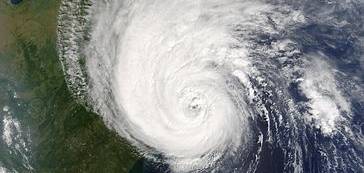
- A new report from the World Meteorological Organization details how climate change broke new records in 2021.
- There were record-breaking heat waves, droughts and hurricanes.
- Sea levels globally reached a new record high and rain was recorded for the first time at Greenland’s highest point.
- Ending fossil fuel use and removing carbon dioxide are some of the actions needed to urgently address climate change, the United Nations says.
Climate change is toppling worrying records around the world, a new report confirms.
State of the Global Climate 2021, from the World Meteorological Organization (WMO), details a raft of extreme weather events last year and warns there’s now a “critical” need for early warning systems to help sectors adapt to climate change.
Global warming has been breaking records for some time, of course. In 2020, NASA and America’s National Oceanic and Atmospheric Administration reported that 2010 to 2019 was the hottest decade since records began in the late 1800s.
Carbon emissions from fossil fuels hit a new record high in 2019. And in 2021, a new record high temperature - of 18.3C - was set in the Antarctic, the UN announced.
Climate Change Records
Here are eight climate change records the world broke in 2021, according to the WMO.
Warmest years on record
The past seven years, between 2015 to 2021, were the warmest years on record, the WMO has warned. Last year alone was between the fifth and seventh warmest year on record globally. The average temperature globally in 2021 was around 1.11C above average world temperatures between 1850 and 1900 – known as the “pre-industrial average”.
Record high sea levels
Sea levels also reached a new record high in 2021. Globally, the sea level rose 4.5mm a year on average between 2013 and 2021. In several regions, the sea level is rising “substantially faster” than the global average, the WMO says. These include the South-west Pacific, the South-west Indian Ocean and the South Atlantic.
Antarctic ozone hole grows “unusually” big
The ozone hole over the Antarctic in 2021 was “larger and deeper” than 70% of the ozone holes measured since 1979, the WMO finds. It expanded to its widest area of the year – 24.8 million km² – during October. The WMO says it was driven by colder-than-average conditions in 2021 in the stratosphere – the second layer of the Earth’s atmosphere from ground level. A strong polar vortex – the band of cold air around the Earth's North Pole – was another key contributing factor.
First ever rain at Greenland’s highest point
Rainfall was recorded for the first time ever at the highest point on Greenland’s ice sheet. This is Summit Station, a research station that is more than 3,200 metres above sea level.
Several hours of rain were observed at Summit Station on 14 August 2021. Air temperatures also stayed above freezing for about nine hours. This was part of an “exceptional” mid-August melt event for Greenland, linked to a mass of warm, humid air, the WMO says.
Climate change led to record-breaking heat waves
In western North America and the Mediterranean, it was “exceptional heat waves” that were breaking records, notes the State of the Global Climate 2021. Death Valley in California recorded the world’s highest-ever temperature since at least the 1930s when the temperature reached 54.4C on 9 July 2021. Italy set a new provisional European record on 11 August when a research station near Syracuse in Sicily recorded a temperature of 48.8C. Kairouan in Tunisia reached a record 50.3C. Spain and Turkey also broke new national records, with a temperature of 47.4C recorded at Montoro in southern Spain and 49.1C at Cizre near Turkey’s border with Syria.
Hurricane Ida matches record wind speeds
When Hurricane Ida hit Louisiana in the United States on 29 August last year, its 240km-per-hour winds matched the strongest landfall on record for the state, the WMO says. Ida was the heaviest hurricane of the North Atlantic season, causing major wind damage and flooding from storm surges. The hurricane caused an estimated $75 billion of economic losses in the US and is blamed for 115 deaths in the US and Venezuela. There were 21 named storms in 2021, well above the average of 14 a year between 1981 and 2010, the WMO notes.
Record flooding in Western Europe
In mid-July 2021, Western Europe saw some of its worst flooding ever recorded. Western Germany and eastern Belgium were worst affected. Hagen in western Germany reported 241mm of rainfall in 22 hours. Rivers flooded, several towns were inundated and there were also landslides. Germany reported 183 deaths and Belgium, 36. The flooding is thought to have cost Germany $20 billion in economic losses. France, the Netherlands, Luxembourg and Switzerland also experienced heavy flooding.
Lowest water level for US reservoir
Drought led to a new water level low for Lake Mead, a reservoir on the Colorado River in Southwestern US. In July, the reservoir fell to 47m below its full capacity, its lowest level on record. Drought also affected other parts of the world, including Iran, Pakistan, Afghanistan, Turkey and Turkmenistan. In Canada, severe drought meant predicted harvest levels for wheat and canola – a crop used to create cooking oil and animal feed – were 35% to 40% below 2020 levels.
What climate action is needed?
In its latest report on actions needed to mitigate climate change, the Intergovernmental Panel on Climate Change (IPCC) calls for the rapid phasing out of fossil fuels, transition at scale to renewable energy and investment in carbon dioxide removal.
These and other actions are set out in the IPCC’s Mitigation of Climate Change report, which found that between 2010 to 2019, global greenhouse gas emissions were at their highest levels in human history.
The UN says affordable, scalable solutions are available now to help countries “leapfrog to cleaner, more resilient economies”.
Written by
Victoria Masterson, Senior Writer, Formative Content
Sources
World Economic Forum
Posted on 2022-05-19 10:58








Comments